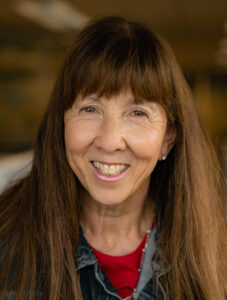Meet new Mitchell Center member Susanne Lee
Mitchell Center members share a passion for tackling complex sustainability problems that matter to people and communities through collaboration with diverse stakeholders and across many different areas of expertise. They come from a wide range of disciplines–from engineering and economics to fisheries and agriculture to business and communication–and take an interdisciplinary approach because that’s what’s needed to meet today’s challenges. They seek to connect knowledge with action to create a brighter social, environmental, and economic future in Maine and beyond.
Learn more about who they are and what they do in this ongoing series of profiles.
 Susanne Lee is an entrepreneurial senior executive who has created, launched and operated successful consumer products brands and businesses. She specializes in strategic solutions, brand marketing, consumer insights, business development, product design and manufacturing, and effective team-building.
Susanne Lee is an entrepreneurial senior executive who has created, launched and operated successful consumer products brands and businesses. She specializes in strategic solutions, brand marketing, consumer insights, business development, product design and manufacturing, and effective team-building.
As the Executive-in-Residence at the Maine Business School, Susanne utilized her business management and marketing background to bring a “real-world” component to student courses and experiential learning opportunities. She helped build bridges between UMaine students and leading Maine-based businesses.
She leads the Mitchell Center project, Food Waste Management: Empowering Maine Businesses Toward Sustainability, identifying sustainable food waste solutions for Maine businesses.
What problem/s are you working to solve?
Our team is working to end wasted food in Maine using sustainable “triple-bottom-line” solutions that are consistent with the Maine food recovery hierarchy, which prioritizes reducing waste and feeding people.
What progress are you making toward solutions?
We are making progress through our first step, working with key Maine stakeholders—our Maine Food Production Leadership Council—to identify six primary solution areas. Our next step is to develop pilots to implement the solutions to prove their effectiveness and scalability—while also working to build awareness, education and action about the need to end food waste in the state.
“One day I realized that sustainability solutions, with their triple-bottom-line benefits, are the true long-term strategy for both businesses and people.”
Specifically, with the expertise and support of the UMaine Division of Marketing and Communications, we have launched the Food Rescue MAINE program with its compelling call to action, “Maine Food – Too Good to Waste.” Through this program we are developing six pilot initiatives: a food waste Track & Measure tool that we are testing with Northern Light Health; a food donation management system to connect food donors, feeding agencies and food rescue volunteers as a test in the Waterville area; a consumer education and action campaign developed with the Maine Department of Environmental Protection that is being tested with select communities and elementary schools; a research project to identify farms’ food-processing infrastructure needs to prevent waste and feed Maine people; a Food Donor Toolkit being promoted with the Maine Grocers and Food Producers Association and state food banks; and community food recycling pilots to divert food waste from landfills and into valuable by-products.
How could your work contribute to a more sustainable future in Maine and beyond?
If Maine can stop food waste—and the related waste of resources used to produce food—and instead channel all food to feed people or feed the soil (which in turn feeds people), we will have solved a global challenge and our work can serve as a model around the world.
Why did you decide to join the Mitchell Center?
With my business background, I have always been a proponent for long-term, strategic thinking. One day I realized that sustainability solutions, with their triple-bottom-line benefits, are the true long-term strategy for both businesses and people. The Mitchell Center’s approach to developing sustainability solutions—interdisciplinary student/faculty teams, stakeholder-driven focus, best-practice benchmarking—was also very appealing.
What’s the best part about collaborating with other researchers, and with stakeholders?
The feeling of teamwork with others who enjoy collaboration and share a passion for continually learning and solving problems together.
Where’s your favorite place in Maine?
So many!
What sustains you?
Being active outdoors in Maine—hiking, gardening, skiing, swimming, paddle-boarding—just enjoying the beauty of nature all around (except the ticks and mosquitos!).
